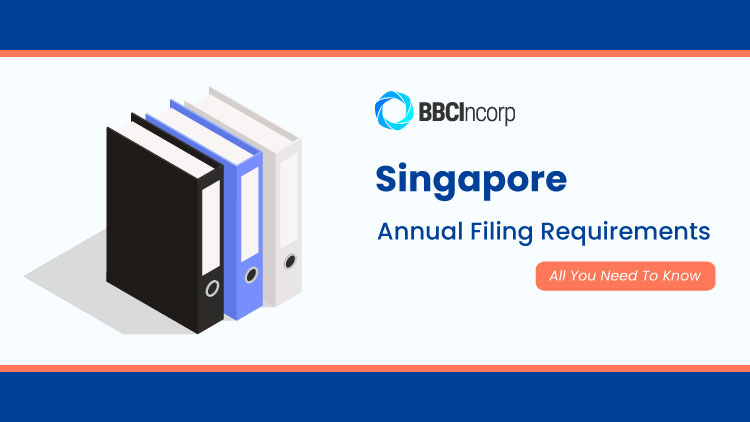
Annual filing is one of the compliance requirements that every business owner in Singapore needs to take heed of. These liabilities vary greatly in their natures, purposes, and deadlines for submission. Having a firm grasp on each of them is a must should you want to facilitate your business and not pay penalties due to ignorance.
An overview of the ACRA and IRAS, and annual filing requirements in Singapore
Accounting and Corporate Regulatory Authority (ACRA) and Inland Revenue Authority of Singapore (IRAS) are the two government agencies responsible for the formulation and imposition of most of the statutory requirements to which locally incorporated companies are subject.
ACRA functions as the main regulatory body that governs every single business entity in Singapore. Under its authority, your company is required to prepare the annual return and financial statements.
IRAS, as the name implies, is a government board taking charge of the administration of affairs related to taxation. Pursuant to it, you are obliged to file the Estimated Chargeable Income (ECI) and Tax Return every year.
In what follows, we will give you a detailed explanation of annual filing requirements in Singapore, which are:
- Filing annual return
- Filing Estimated Chargeable Income
- Filing Annual Tax Return
Preparing financial statements
You should discuss with your accountants to reach an informed decision on the frequency with which you prepare the financial statement in Singapore.
Assuming that there is a considerable volume of transactions waiting for you to handle every month, it is advisable to do routine bookkeeping, say, every month.
On the flip side, if there are not many taking place each month and if you consider recording them that often is to no avail and costly, you should collect the financial statements at least once or a couple of times a year i.e. semi-annually or quarterly.
A well-prepared financial statement should incorporate the following components:
- Statements of Comprehensive Income, that is, the profit and loss account
- Statement of Financial Position, that is, the balance sheet
- Cash flow statement
- Statement of Changes in Equity
Auditing your financial statement
You are obliged to file an audited financial statement prepared following the Financial Reporting Standards of Singapore (SFRS). The purpose is to substantiate the credibility of your report on the company’s financial health and financial standing.
That being said, you would be entitled to the exemption of this requirement as long as your company is grouped under the category of “small company” by meeting 2 out of the following 3 criteria:
- Its total revenue yielded from the previous fiscal year did not go beyond S$10 million
- Its total assets at the end of the financial year in question did not go beyond S$10 million
- Its total employees on the payroll are less than 50
Filing an annual return with ACRA
For administrative purposes, every locally incorporated company is put under a statutory obligation to file the annual return, pursuant to the ACRA. They make it clear that by lodging this electronic document every year, companies can keep their registered information on ACRA’s system up-to-date and relevant.
Before the appointed signatory – either a director or your company secretary validates the annual return, you should see to it that the following particulars have been taken into account:
- Your company’s name and registration number
- Principle Activities
- Registered Office Address
- Details of company officers (directors, secretary)
- Shareholders’ details, share capital, etc.
- Financial statements
According to section 197(1)(b) of the Companies Act, Cap 50 (“the Act”), you (and other companies with a Financial Year Ending before 31 Aug 2018) are required to perform this task within 30 days after the Annual General Meeting (where the financial statement is formally tabled) takes place.
Filing of estimated chargeable income with IRAS
The Estimated Chargeable Income (ECI) is simply the result of your company appraising its income for a given Year of Assessment.
Under the Inland Revenue Authority of Singapore (IRAS), ECI has deemed a regulatory requirement; and companies are obliged to prepare and submit it once a year.
The deadline for submission is within a period of 3 months since the end of your fiscal year. IRAS would in advance give you a notification to advise you of the requirement 1 month before your fiscal year ends.
Your company would be exempted from this requirement provided that:
(1) your estimated chargeable income (ECI) is nil; and
(2) your annual revenue is below S$5 million.
Find out how to choose and change your financial year end in Singapore.
Filing an annual tax return with IRAS
An annual tax return is simply a record of taxable income and other information related to the taxation of a company for a given year of assessment.
In Singapore, you are required to complete the Annual Tax Return and submit it to IRAS before November 30.
IRAS also adopts a previous-year approach to its taxation practices and procedures. In other words, your tax is assessed on the basis of the preceding year’s taxable income.
If your company has been dormant during the assessment year- i.e., it neither operates nor generates profits in the previous fiscal year, you can appeal for the waiver of this requirement as long as meeting the qualifying conditions below:
- Has submitted tax returns and financial statements until the date of business cessation;
- Must not own any investments or derive income from these investments;
- Must deregister for Goods and Services Tax (GST) if it is a GST-registered company;
- Does not intend to reinstate business within the next 2 years.
Need help with your annual filing requirements?
We offer Singapore accounting & tax filing services that help you handle your obligations with ease and confidence. Chat with us for practical advice!
Consequences of failing the annual filing requirements in Singapore
Non-compliance with ACRA
If you fail to comply with any obligations imposed by ACRA in a timely manner, you will face a penalty (typically referred to as a composition fee) of S$300 for each violation, be it the failure to meet the deadline for convening AGM, submit an annual return or file the financial statement.
Non-compliance with IRAS
You should file your annual return well before the above-mentioned deadline, failing which would result in IRAS sending you an estimated Notice of Assessment stating their estimate of your company’s income for tax purposes.
Upon receipt of this letter, you need to make haste and pay the sum specified within a month even if you don’t agree with the estimated tax, or else you may face financial penalties.
In the event that IRAS’s assessment is off the mark, you could directly reply with a Notice of Objection within 2 months, including the account for your failure to meet deadlines and your new estimated ECI. Thereafter, you are required to pay the taxes on ECI within 1 month.
Any further breaches of these obligations will lead to enforcement action such as a large composition fee of up to S$1,000, a summons to appear in court, penalties, or even a forced strike-off.

COMPLYMATE
Tired of sifting through endless paperwork to understand jurisdictions’ compliance requirements? Our guide can help!
Try Now

Ready for your incorporation in Singapore? BBCIncorp is your trusted Singapore company formation service provider!
Disclaimer: While BBCIncorp strives to make the information on this website as timely and accurate as possible, the information itself is for reference purposes only. You should not substitute the information provided in this article for competent legal advice. Feel free to contact BBCIncorp’s customer services for advice on your specific cases.
Industry News & Insights
Get helpful tips and info from our newsletter!
Stay in the know and be empowered with our strategic how-tos, resources, and guidelines.





